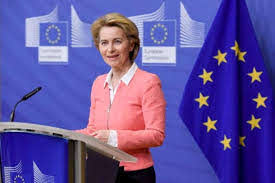The European Parliament on Wednesday ratified the post-Brexit EU-UK Trade and Co-operation Agreement (TCA) in a strategic move to ensure that tariff and quota free trading regime continues among the countries.
The trade deal has been operating provisionally since January until late Tuesday, the MEPs voted in favour of the ratification by 660 votes to 5, while 32 abstained.
The UK’s chief negotiator, Lord Frost, enthused that the vote “brings certainty and allows us to focus on the future”.
In his remarks, the British Prime Minister, Boris Johnson, described the ratification as a “final step in a long journey”, adding that the latest trade deal provided “stability to our new relationship with the EU as vital trading partners, close allies and sovereign equals.”
The result of the vote had been welcomed by European Commission President, Ursula von der Leyen, while the parliament’s Brexit Co-ordinator, Guy Verhofstadt, described the deal as “a failure for both sides, but better than nothing”.
This is even Michel Barnier, Lord Frost’s oppose in the Brexit talks, was quoted as telling MEPs that the trade deal as a divorce and a failure of the European Union which everyone has to learn lessons from it.
Despite the deal, Brexit tensions are still rife with a French threat of “reprisals” against the UK over new fishing restrictions. Also Northern Ireland trade still remains a thorny issue.
Also, under a separate protocol, Northern Ireland remained de facto part of the EU’s single market which implies that goods exported from there to Britain have to undergo EU checks.
The newly ratified TCA covers EU-UK trade in goods, but not services such as in banking, insurance, advertising and legal advice sectors, which the UK economy is largely dominated by dependent on
However, the TCA which does not cover foreign policy, financial services and student exchanges, has resulted in more paperwork, extra costs and less trade between the polarized blocs, since the UK left the EU.
News report on the outcome of the trade deal indicated that before the MEPs’ debate commenced on Tuesday, French Europe Minister, Clément Beaune, accused the UK of blocking fishing rights and threatened that the EU could respond with “reprisals” in financial services.
He maintained: “The United Kingdom is expecting quite a few authorisations from us for financial services. We won’t give any for as long as we don’t have guarantees on fishing and other issues.”






